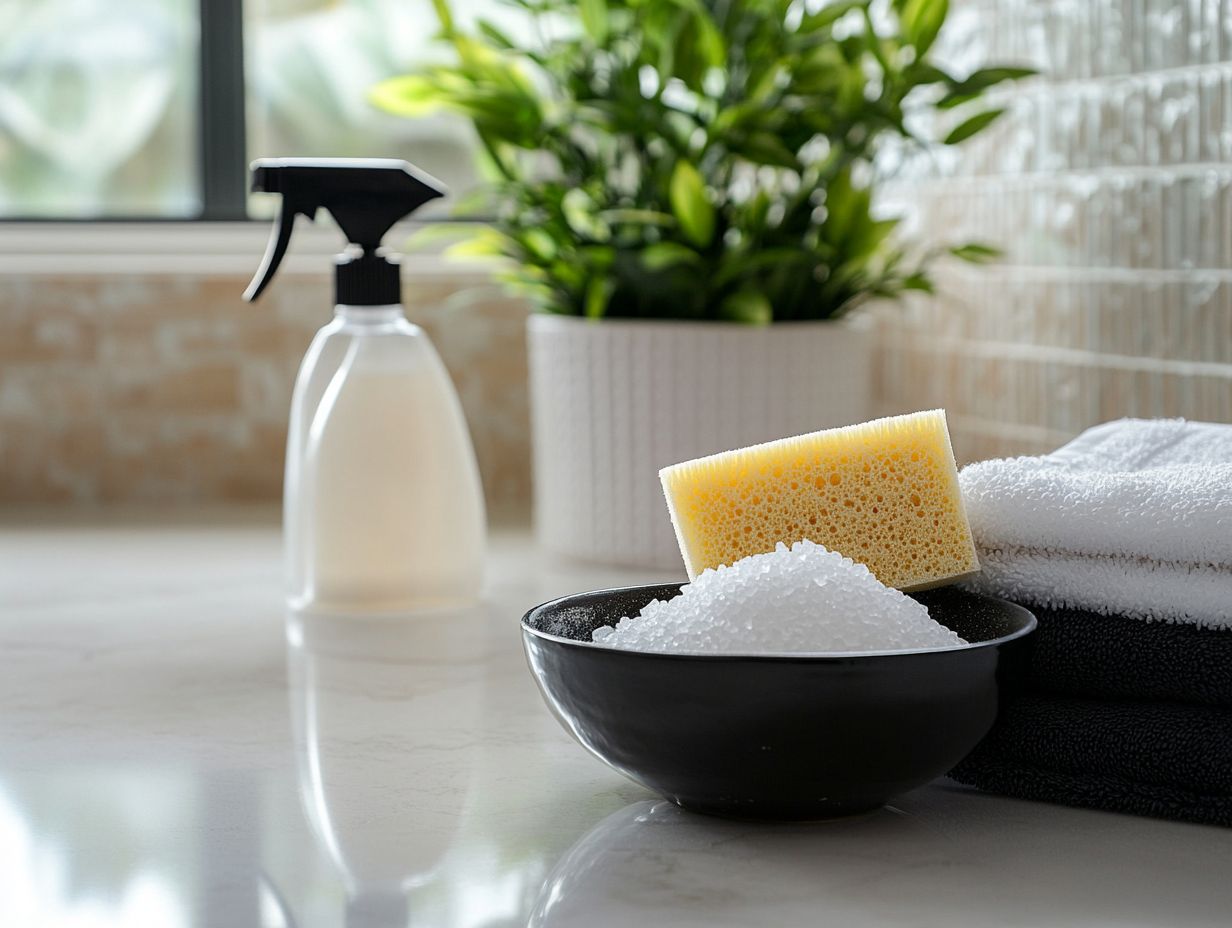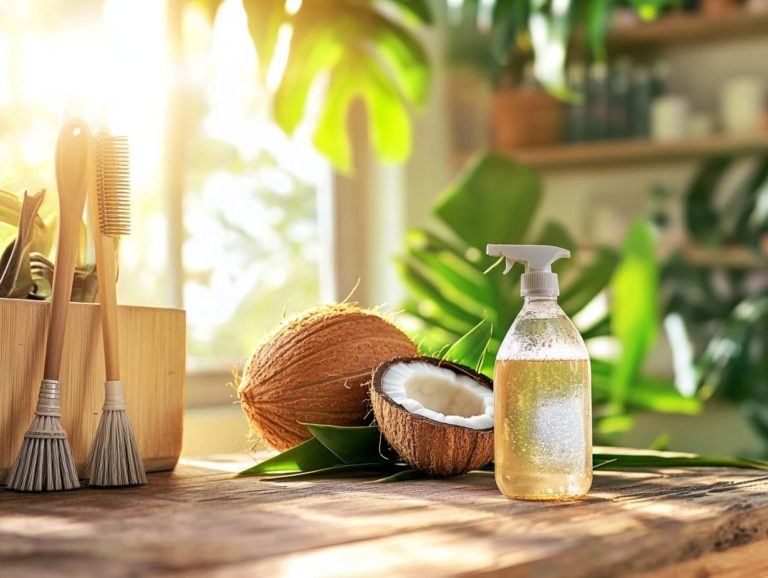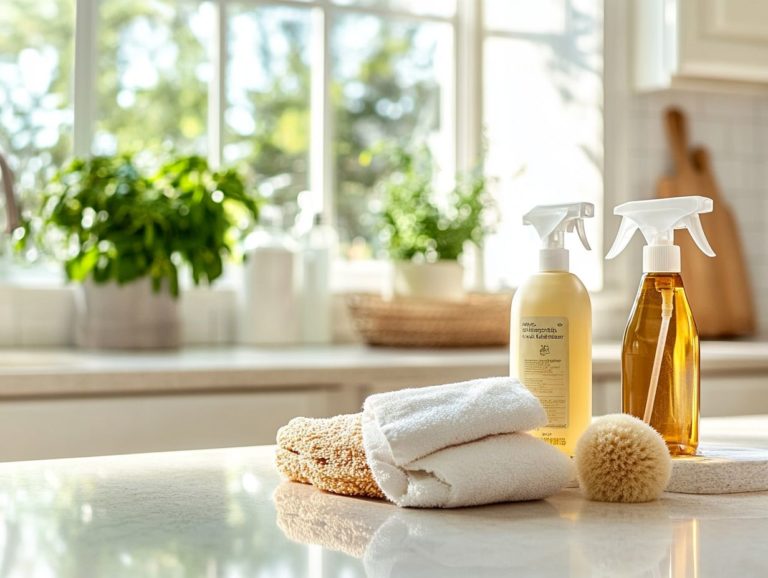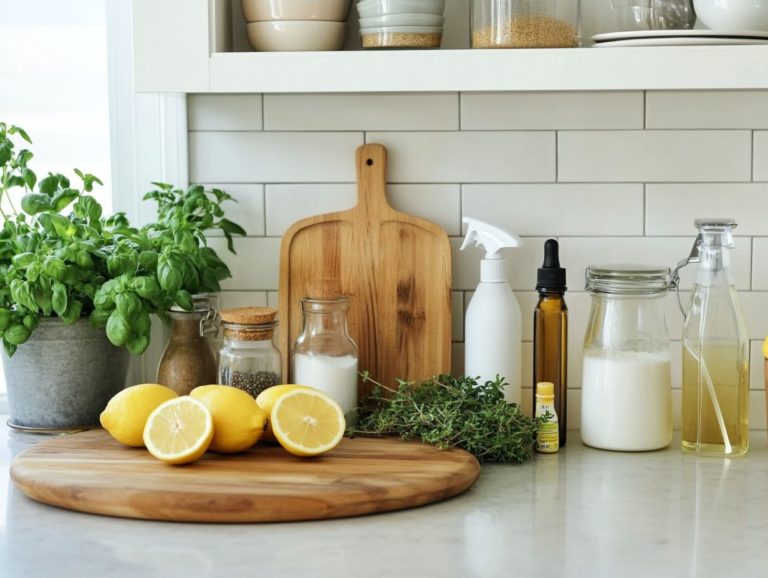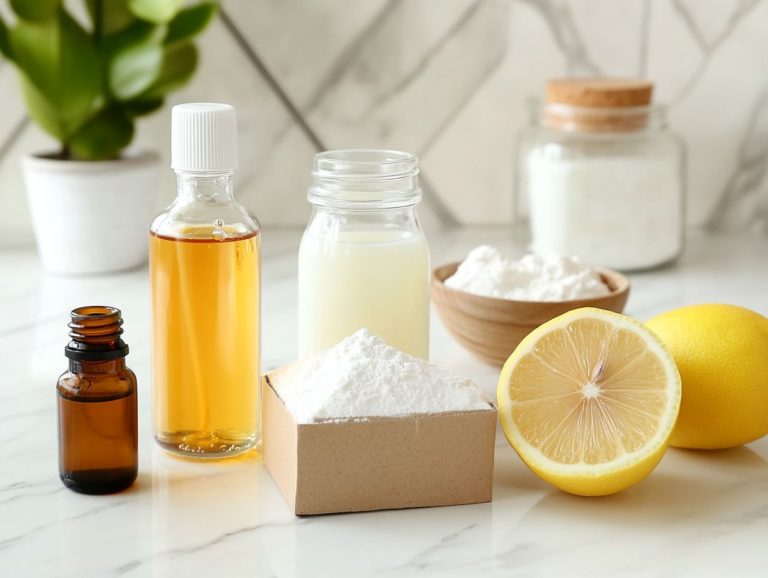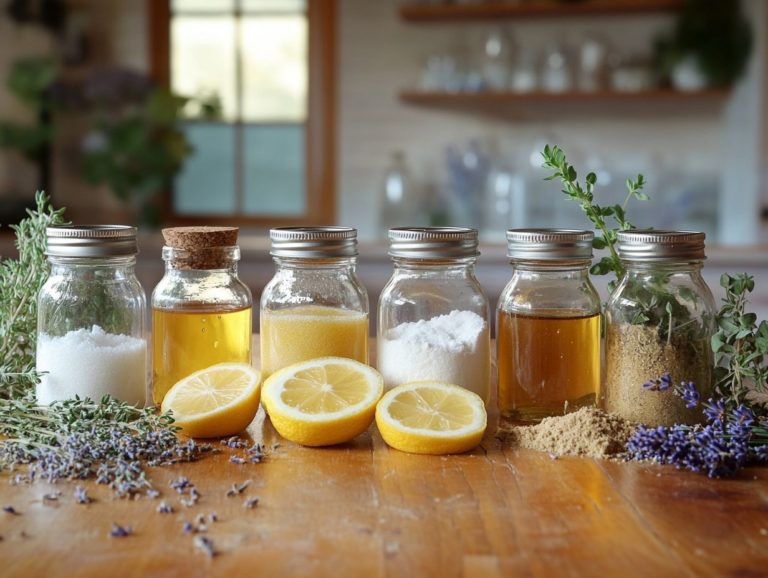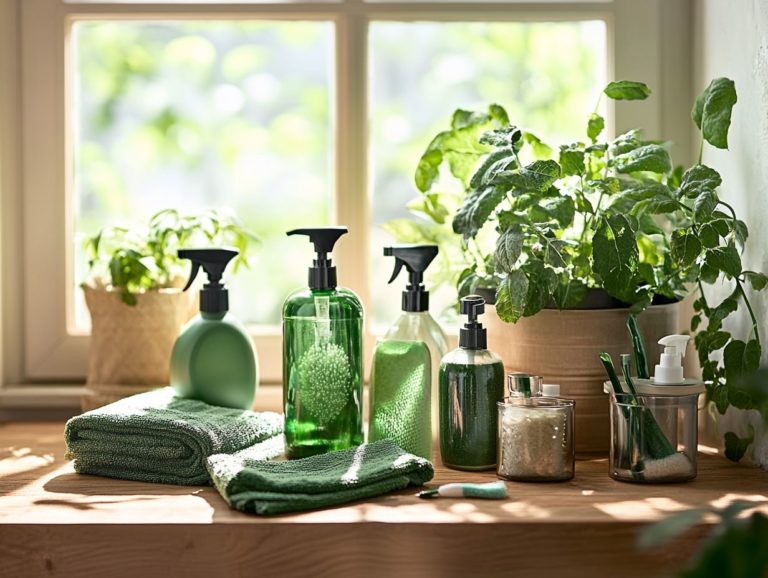5 Ways to Use Epsom Salt for Cleaning
Epsom salt, often celebrated for its calming effects in your baths, is also a hidden gem in the household cleaning world.
This remarkable mineral is not just a one-trick pony; it can handle many household cleaning tasks, from scrubbing surfaces to revitalizing carpets, all while being kind to the planet.
Here are five effective ways you can tap into the cleaning prowess of Epsom salt, along with its benefits, creative applications, safety tips, and seamless ways to incorporate it into your cleaning routine.
Discover how this humble ingredient can transform your space and make chores enjoyable!
Contents
- Key Takeaways:
- 1. Scrubbing Surfaces
- 2. Removing Stains
- 3. Cleaning Dishwasher and Washing Machine
- Safety Tips
- 4. Unclogging Drains
- 5. Freshening Up Carpets
- What Is Epsom Salt and How Does It Work for Cleaning?
- Frequently Asked Questions
- What is Epsom salt and how is it used for cleaning?
- What are the benefits of using Epsom salt for cleaning?
- How can Epsom salt be used to clean carpets and upholstery?
- Can Epsom salt be used to unclog drains?
- In what other ways can Epsom salt be used for cleaning?
- Are there any precautions to take when using Epsom salt for cleaning?
Key Takeaways:
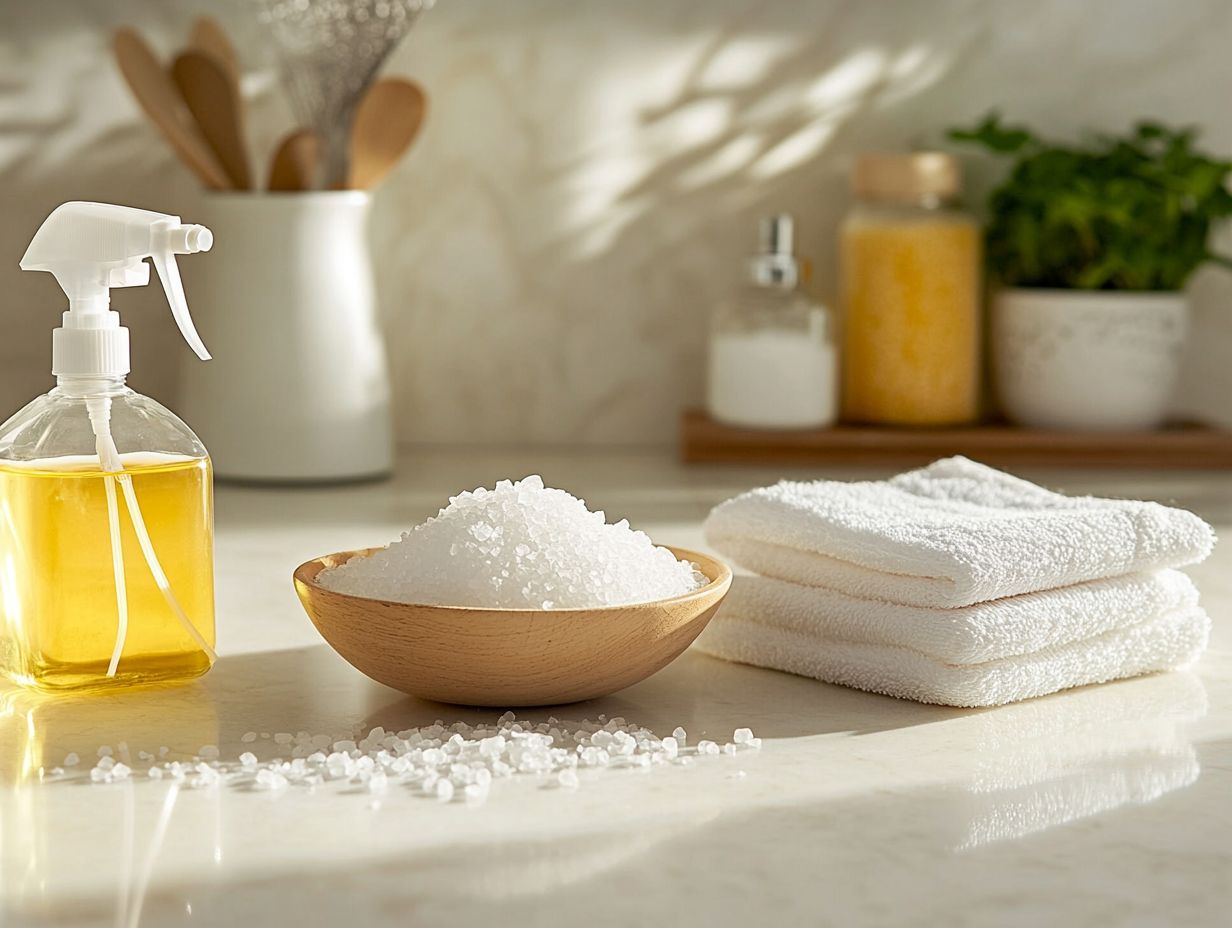
- Epsom salt is a versatile and affordable cleaning agent that can be used to scrub surfaces, remove stains, and unclog drains.
- Epsom salt cleans effectively and has beneficial properties such as deodorizing (removing bad smells), disinfecting (killing germs), and softening hard water.
- In addition to traditional cleaning tasks, Epsom salt can freshen up carpets, deodorize trash cans, and clean the dishwasher and washing machine.
1. Scrubbing Surfaces
Scrubbing surfaces is vital for maintaining a pristine home. Incorporating Epsom salt into your cleaning routine can boost your efforts. Its natural properties effectively remove grime and soap scum from various surfaces, including stainless steel and chrome hardware a tip backed by cleaning experts like Logan Taylor and Jess Farinha.
Integrating Epsom salt into your regimen boosts effectiveness and aligns with eco-friendly practices. For example, combining Epsom salt with a splash of vinegar creates a powerful scrub that tackles stubborn stains on ceramic tiles. Similarly, mixing it with lemon juice is perfect for freshening up your countertops.
When cleaning wood surfaces, exercise caution. A gentle blend of Epsom salt and olive oil provides a delicate yet thorough clean without harming the finish. These techniques ensure that every material receives the care it deserves, fostering a healthier living environment.
2. Removing Stains
When it comes to removing stains, Epsom salt emerges as an effective cleaning solution that rejuvenates your household items while remaining eco-friendly and efficient. This natural mineral compound is versatile enough to handle a wide range of stains, from ink and wine to grease and coffee.
To tackle stubborn grease stains on fabrics, simply combine Epsom salt with dish soap and water to create a paste. Gently rub this mixture into the stained area before washing, and watch those stains disappear!
If you re dealing with pesky coffee or tea spills on surfaces, mix Epsom salt with white vinegar to form a potent solution. Apply it to the stained areas, and you’ll restore cleanliness effortlessly.
For stained cookware, a paste made from equal parts Epsom salt and baking soda works wonders. Scrub it onto the affected areas, and after a good rinse, you’ll be left with a sparkling finish.
With these clever hacks, Epsom salt proves to be a critical ally in your quest for a spotless home!
3. Cleaning Dishwasher and Washing Machine
Cleaning your dishwasher and washing machine with Epsom salt elevates their performance, ensuring they run smoothly while deodorizing these appliances and leaving behind a refreshing scent.
By harnessing the natural properties of Epsom salt, you can effectively tackle the build-up and residue that often accumulates from regular use. To get started, add a cup of Epsom salt directly into the empty drum of your washing machine or sprinkle it at the bottom of the dishwasher before running a hot cycle. This simple process helps break down stubborn grime and significantly reduces unpleasant odors.
Incorporating Epsom salt into your regular maintenance routine prolongs the lifespan of these essential household appliances, making laundry days and dish clean-ups a more pleasant experience. Using Epsom salt as laundry detergent enhances the cleanliness and softness of your fabrics!
Safety Tips
When using Epsom salt for cleaning, always ensure proper ventilation. Avoid ingesting Epsom salt in large amounts, and keep it out of reach of children and pets.
Try using Epsom salt in your next cleaning session!
4. Unclogging Drains
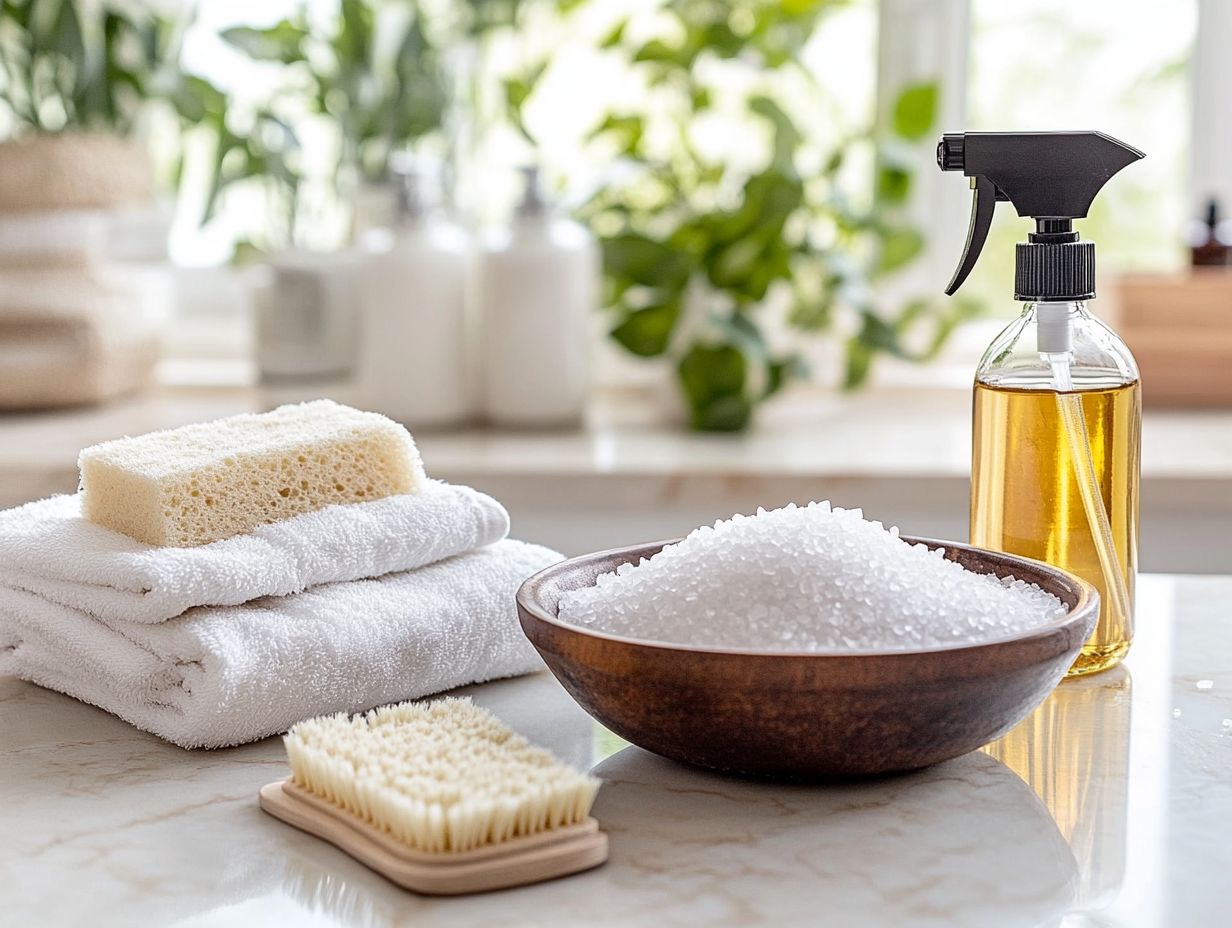
Unclogging drains may seem like a daunting endeavor, but with Epsom salt in your arsenal, you can tackle it with ease while embracing an eco-friendly approach. This simple yet effective mineral compound serves as a natural cleaning solution that excels at breaking down grime and debris, all without the harsh chemicals typically found in commercial drain cleaners.
To whip up your own DIY cleaning solution, combine one cup of Epsom salt with one cup of baking soda and pour it down the troubled drain. Following this, pour in a pot of boiling water, which will work to dissolve the mixture and dislodge any stubborn debris.
For ongoing maintenance, consider adopting a routine where you flush your drains with a blend of Epsom salt and warm water every few weeks. This proactive measure will help you keep your pipes clear and significantly reduce the chances of future blockages.
5. Freshening Up Carpets
To refresh your carpets, consider using Epsom salt as an effective cleaning solution. It not only eliminates odors but also revitalizes the fabric, making it a superb choice for eco-conscious household chores.
By absorbing moisture and breaking down grime, this natural mineral can help you maintain a clean and inviting atmosphere in your living spaces. When you apply Epsom salt to your carpets, mixing it with baking soda can boost its deodorizing power. Adding a few drops of essential oils, like lavender or tea tree oil, not only lends a delightful fragrance but also provides additional antimicrobial benefits.
For optimal results, sprinkle the mixture evenly across the carpet and let it sit for at least 15 minutes before vacuuming. Regular maintenance, such as this, should ideally be done once a month to keep your carpets looking fresh and vibrant. This technique can also help deodorize shoes and freshen the look of your carpets.
What Is Epsom Salt and How Does It Work for Cleaning?
Epsom salt, or magnesium sulfate if you want to get technical, is a remarkably versatile substance that you can leverage for both health benefits and household cleaning. Its natural properties enable it to break down grime effectively, enhancing your cleaning solutions for various tasks around the home, from cleaning surfaces to scrubbing pots and pans.
This compound is composed of magnesium, sulfur, and oxygen elements that not only contribute to its beneficial effects on your body but also make it a formidable ally in your cleaning endeavors. The unique chemical structure of Epsom salt allows it to dissolve tough stains and mineral deposits with ease, making it particularly effective in spaces like bathrooms and kitchens.
Unlike many traditional cleaning products laden with harsh chemicals, Epsom salt provides an eco-friendly alternative that ensures your surfaces are clean and free from potentially harmful residues. Integrating this compound into your cleaning routine is a breeze; simply add it to water for scrubbing surfaces or mix it with vinegar for a natural disinfectant. You ll discover that efficiency in cleaning can effortlessly coexist with sustainability.
What Are the Benefits of Using Epsom Salt for Cleaning?
Using Epsom salt for cleaning comes with a multitude of advantages that elevate your cleaning routine. Not only is it eco-friendly and cost-effective, but it also tackles tough grime and odors while offering health benefits like stress relief and improved sleep. Additionally, it can be used for body aches and to exfoliate skin, making it an invaluable addition to your cleaning products and personal care arsenal.
This versatile mineral compound effortlessly replaces harsh chemicals found in traditional cleaners, making it a safer choice for households with children and pets. When you dissolve it in water, it transforms into a powerful scrubbing agent, perfect for banishing stubborn stains from your kitchen surfaces and bathroom tiles. In your laundry, Epsom salt works wonders by brightening whites and softening fabrics without any harmful additives.
But its benefits don’t stop there. The soothing properties of Epsom salt contribute to your overall wellness by alleviating muscle soreness when used in baths, showcasing its dual functionality as both a cleaner and a remedy. Embracing Epsom salt in your cleaning arsenal not only enhances your home s environment but also promotes your well-being.
What Are Some Other Creative Ways to Use Epsom Salt for Cleaning?
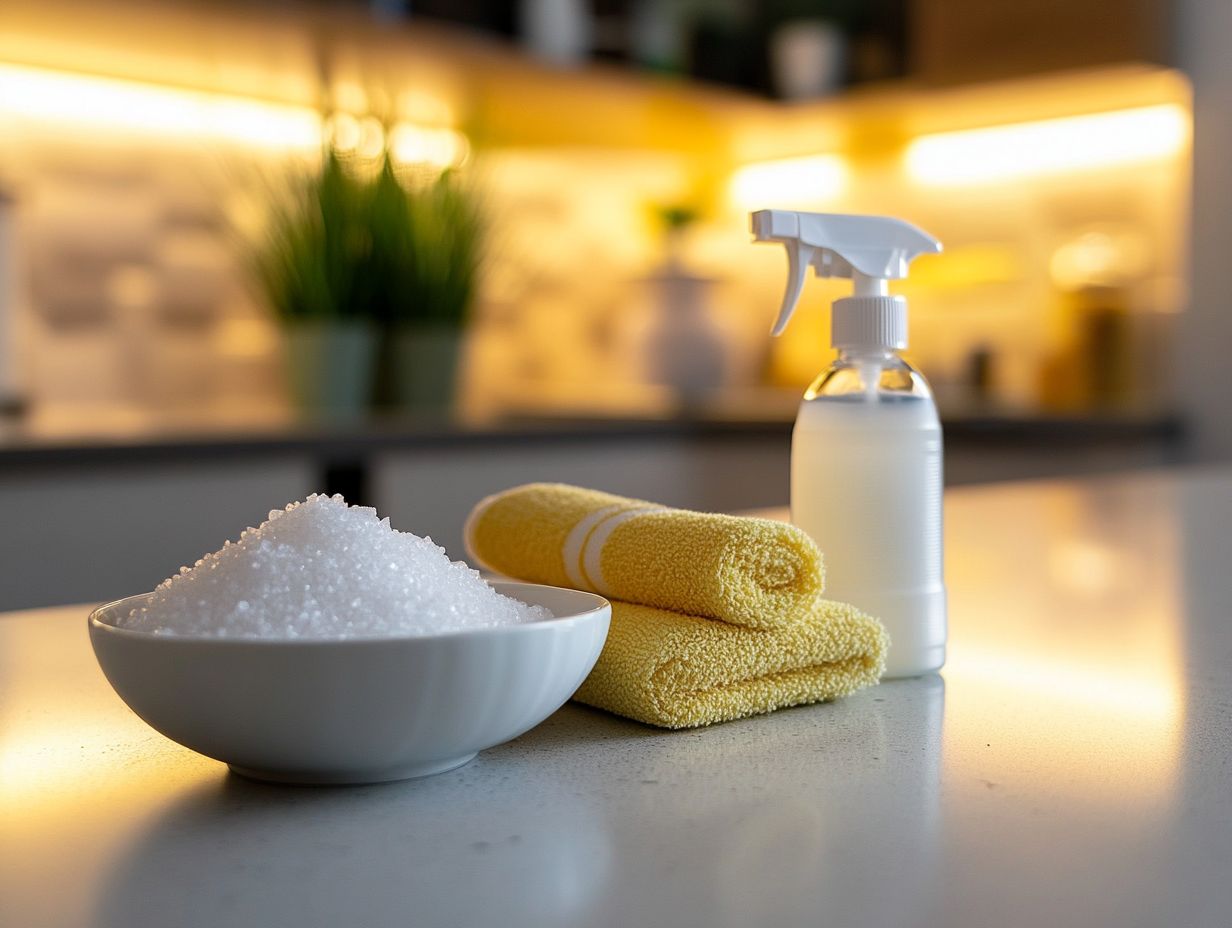
Beyond traditional cleaning applications, Epsom salt offers creative solutions for household chores and garden care. It provides unique remedies for both bug bites and plant growth.
If pesky bug bites are bothering you, consider a simple Epsom salt soak. Add a cup of Epsom salt to a warm bath. It draws out excess fluid, reducing inflammation and discomfort. This remedy also helps treat athlete’s foot and other skin irritations.
Epsom salt isn t just for first aid. In your garden, it can be sprinkled around plants like tomatoes and peppers to increase magnesium in the soil. This boost enhances nutrient absorption and improves overall plant health.
Using Epsom salt as a natural pesticide effectively deters pests. It promotes lush, vibrant foliage and flowers in your garden. Additionally, for those who love to polish silverware, Epsom salt can help clear grime and restore shine.
Is Epsom Salt Safe for All Types of Surfaces?
Epsom salt is generally safe for cleaning a variety of surfaces. However, it s crucial to know which surfaces are compatible to avoid potential damage. Renowned cleaning experts like Logan Taylor and Jess Farinha emphasize understanding these compatibilities for effective cleaning.
For common household materials like tiles, bathtubs, and kitchen sinks, this natural mineral works wonders. It dissolves mineral deposits and grime without scratching or harming the finish. Yet, exercise caution with softer surfaces, such as natural stone like marble and granite. The abrasive texture of Epsom salt can scratch or dull these surfaces.
You can use Epsom salt to clear grime from stainless steel appliances and polish chrome hardware effectively.
Avoid using Epsom salt on delicate fabrics or finishes, including wood and certain metals, as it may cause corrosion or staining. Also, refrain from using it on cutting boards because it can retain odors. By understanding these guidelines, you can maximize the benefits of Epsom salt while protecting your home surfaces.
What Are the Possible Side Effects of Using Epsom Salt for Cleaning?
Use Epsom salt wisely for the best results!
While Epsom salt is generally considered safe and effective, be mindful of potential side effects. These may include residue buildup, or leftover salt that can make surfaces feel gritty, and reactions with certain cleaning products that could reduce its effectiveness. Cleaning experts like Erin Zanelli highlight these potential pitfalls.
To achieve the best results and minimize issues, consider using Epsom salt alongside natural cleaners, which are made from ingredients found in nature with fewer chemicals. Test a small area first before committing to full use. It s essential to rinse surfaces thoroughly after cleaning to avoid any lingering salt residue.
Avoid mixing Epsom salt with harsh chemicals, as this could produce harmful fumes or undermine the advantages of both cleaning agents. For instance, mixing it with soap scum removers can be particularly troublesome.
By following these guidelines, you can maintain a safe and effective cleaning routine that enhances your home without unwanted side effects.
How Can One Incorporate Epsom Salt into Their Cleaning Routine?
Recommended by Tranquil Home Eco-Friendly Cleaning Services.
Incorporating Epsom salt into your cleaning routine can be a seamless enhancement, elevating your household chores with its remarkable cleaning properties while promoting an eco-friendly approach. Whether you re dealing with tough stains or just looking to freshen the look of your home, Epsom salt is a versatile ally in home cleaning.
This versatile mineral compound proves to be a powerful ally in various cleaning tasks, whether you re tackling stubborn stains or refreshing your carpets. For example, you can sprinkle Epsom salt on surfaces before scrubbing, taking advantage of its abrasive texture to lift dirt more effectively. When combined with warm water and a touch of liquid soap, it transforms into an excellent all-purpose cleaner for countertops and bathroom fixtures. It s also effective for cleaning techniques like scrubbing surfaces and deodorizing trash cans.
It even works wonders for deodorizing and rejuvenating carpets simply scatter it onto the carpet, let it sit for about 30 minutes, and then vacuum it up. By integrating these straightforward methods, you can elevate your cleaning routine and fully enjoy the benefits that Epsom salt offers. Moreover, you can freshen carpets and deodorize shoes with this natural cleaner.
Frequently Asked Questions
What is Epsom salt and how is it used for cleaning?
As detailed in Southern Living, Epsom salt is highly versatile.
Epsom salt, also known as magnesium sulfate, is a naturally occurring mineral compound. It has various uses, including as a cleaning agent. It can be used to scrub and remove stains, deodorize and freshen up surfaces, and even unclog drains. It s also effective in household cleaning, such as washing pots, cleaning mugs, and deodorizing trash cans.
What are the benefits of using Epsom salt for cleaning?
As highlighted by London House Cleaners, the benefits are remarkable.
Aside from being a natural and cost-effective cleaning solution, Epsom salt has numerous benefits. It is non-toxic, gentle on surfaces, and does not leave behind harmful residues. It also has antimicrobial properties, making it effective in eliminating germs and bacteria. Its natural properties make it a great addition to an eco-friendly scrub, preventing odors and lifting stains.
How can Epsom salt be used to clean carpets and upholstery?
According to cleaning tips from Waffle House, this method is effective.
Epsom salt can be mixed with equal parts of water and dish soap to create a powerful carpet and upholstery cleaner. Apply the mixture to the stained area, let it sit for a few minutes, then scrub and rinse with water. The salt will help lift and remove tough stains. This method is effective for stain removal and freshening up the look of fabrics.
Can Epsom salt be used to unclog drains?
It s a handy tool in Epsom salt cleaning recipes.
Yes, Epsom salt can be an effective and natural way to unclog drains. Mix equal parts of Epsom salt and baking soda, pour it down the drain, and chase it with boiling water. Let it sit for a few minutes before running water to flush out the clog. This method also helps in removing grime and soap scum from your pipes.
In what other ways can Epsom salt be used for cleaning?
Consider these additional cleaning hacks.
Epsom salt can also be used as a laundry booster, dishwashing agent, and a general household cleaner. It can help remove grime and grease, eliminate odors, and leave surfaces looking shiny and clean. It can even be used as a natural fabric softener. For washing machine maintenance, it can help in keeping the drum fresh and clean. You can also use it to wash pots and pans, keeping them free from tough stains.
Are there any precautions to take when using Epsom salt for cleaning?
Essential for safe household chores.
Although Epsom salt is generally safe to use, it is important to avoid using it on delicate surfaces or materials, such as marble or silk. It is also recommended to test it on a small, inconspicuous area first to ensure it does not cause any damage. Always follow the instructions and use proper protective gear, such as gloves, when handling Epsom salt. Remember, it can absorb moisture, so store it in a dry place.

